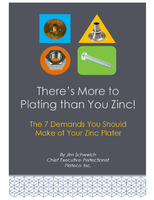White Paper addresses proposed revisions to RoHS Directive.
Share:
Press Release Summary:
The Electronic Interconnection Industry Supply Chain's Response to the Öko-Institut Recommendations for Proposed Revisions to the RoHS Directive is the culmination of presentations made during IPC workshop on June 18, 2008. Paper provides point by point summary of technical issues not considered by Öko-Insitut in their report. According to IPC's Fern Abrams, recommendations in report are arbitrary, lack sound scientific basis, and would have negative impact on IPC members and industry.
Original Press Release:
IPC White Paper Voices Technical Perspective on Proposed Revisions to RoHS Directive
BANNOCKBURN, Ill., USA, September 19, 2008 - IPC - Association Connecting Electronics Industries® announced today the release of a new white paper, The Electronic Interconnection Industry Supply Chain's Response to the Öko-Institut Recommendations for Proposed Revisions to the RoHS Directive.
The white paper is the culmination of presentations made during an IPC workshop on June 18, 2008, in Brussels. Industry leaders, representing key segments of the electronics supply chain, came together at the workshop to detail industry concerns with the Öko-Institut report on the proposed expansion of RoHS substance restrictions.
As an example, in their draft report to the European Commission, the Öko-Institut recommended the restriction of Tetrabromobisphenol A (TBBPA), the flame retardant used to protect more than 80 percent of printed circuit boards, despite the fact that TBBPA was found to be safe by a comprehensive European Union (EU) Risk Assessment. In addition to TBBPA, Hexabromocylcododecanes (HBCDDs), several phthalate plasticizers, and all organic compounds containing chlorine and bromine, are identified in the report as suggested bans.
"The white paper has a long title for what is essentially a point by point summary of technical issues not considered by the Öko-Institut in their report," explained Fern Abrams, IPC's director of government relations and environmental policy. "It is important that the commissioners understand the Öko-Institut recommendations are arbitrary, lack a sound scientific basis and would have a significant negative impact on our members and the industry."
As part of its ongoing advocacy efforts on behalf of its members, IPC will share the white paper with EU commissioners and other key decision makers. The white paper is available for free download from IPC's Web site at http://www.ipc.org/EHS.
About IPC
IPC (www.IPC.org) is a global trade association based in Bannockburn, Ill., dedicated to the competitive excellence and financial success of its 2,700 member companies which represent all facets of the electronics industry, including design, printed board manufacturing, electronics assembly and test. As a member-driven organization and leading source for industry standards, training, market research and public policy advocacy, IPC supports programs to meet the needs of an estimated $1.5 trillion global electronics industry. IPC maintains additional offices in Taos, N.M.; Arlington, Va.; Garden Grove, Calif.; Stockholm, Sweden; and Shanghai, China.




